A fresh-faced 21-year-old Lee Remick made her motion picture debut as a seductive baton-twirling high school drum majorette in Elia Kazan’s 1957 classic, A Face in the Crowd. Remick’s rendering of a precocious but empty-headed teen who becomes the bride of a lecherous drifter turned media celebrity (Andy Griffith) would launch her on the path to movie stardom.
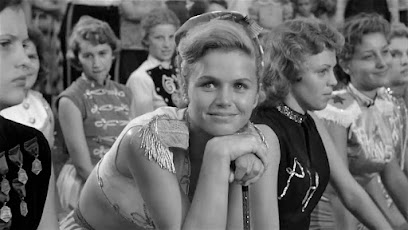 |
| A Face in the Crowd (1957) |
Because this first film role so powerfully showcased her sex appeal, she was cast in similar if only slightly more adult roles in her next films. Co-starring with Orson Welles, Paul Newman and Joanne Woodward, she portrayed Tony Franciosa’s flighty, flirty Southern belle wife in The Long, Hot Summer (1958). In Anatomy of a Murder (1959) she was a reckless tease married to soldier Ben Gazzara and central to the murder trial at which attorney James Stewart defended him.
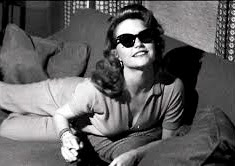 |
| Anatomy of a Murder (1959) |
Lee Remick’s much-touted sensuality would prompt 20th Century Fox PR to promote her as “the American Brigitte Bardot,” but the actress resisted the label and rebelled against being typecast. The truth was that Lee was more than a sexy “honey-haired beauty." She had been acting seriously since her teens, studied at the Actors Studio, and before being cast by Kazan in her first film she had already performed on Broadway and appeared many times on most of the live drama anthologies of TV’s Golden Age. In fact, it was one of her performances in a 1956 episode of Robert Montgomery Presents that caught Elia Kazan’s attention when he was casting A Face in the Crowd.
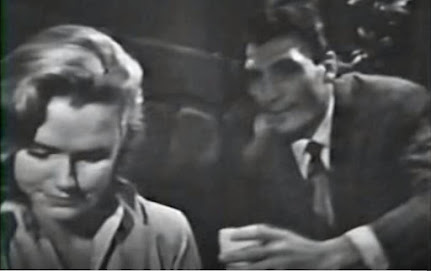 |
| Lee Remick and Jack Palance in "The Last Tycoon" on TV's Playhouse 90 (1957) |
It would take some time, but she would eventually establish film credentials as a dramatic actress. She was featured in the Blake Edwards thriller Experiment in Terror (1962) as an earnest bank employee who becomes the target of a vicious psychopath. Next came the challenging - and acclaimed - role in Edwards's wrenching Days of Wine and Roses (1962). In it Lee portrayed the wife of a harried, hard-drinking ad man (Jack Lemmon) who draws her into an all-consuming alcoholism. Remick’s bravura performance as a shattered alcoholic wife and mother who cannot break her addiction brought an Oscar nomination. That year was a competitive one in the Best Actress category, but another nominee, the formidable Bette Davis (What Ever Happened to Baby Jane?), reportedly saw Lee as her prime competition. "Miss Remick's performance astounded me, and I thought, if I lose the Oscar it will be to her," she said (Anne Bancroft ultimately won for The Miracle Worker).
Days of Wine and Roses, made in 1962 when she was just 26, was arguably the high water mark of Lee's film career. During the ‘60s she appeared in a raft of movies, most of them popular, opposite top leading men of the day, including Montgomery Clift, Steve McQueen, Glenn Ford, Burt Lancaster, Frank Sinatra and Rod Steiger. Two of the best of her later '60s films came back-to-back in 1968, No Way to Treat a Lady with Steiger and The Detective with Sinatra.
But she also had her disappointments. In 1966 she’d originated the female lead, a blind woman targeted by home-invading thugs, in Wait Until Dark on Broadway and was Tony-nominated for it. However, when the play was adapted to the screen, her role went to Audrey Hepburn. She would lose out on the Mrs. Robinson part in The Graduate and reportedly turned down the title role in Hitchcock’s Marnie, which is interesting since once the Bardot comparisons subsided, she was likened to Hitchcock's muse, Grace Kelly. This comparison, though possibly more accurate, did not sit well with Lee either. In an interview with columnist Joe Hyams she got testy when the subject came up. "I'm an actress and a woman," she declared, "and you can't classify me...nor dispose of me by comparing me to Brigitte Bardot or Grace Kelly." As time passed she began to feel that she was being offered “the same [film] script over and over again,” so she started to accept more roles on television. The TV work, she said, seemed to offer more “fertile ground” for her as an actress.
As it happened, the rise of the made-for-TV movie and the mini-series on U.S. television coincided with Lee's increased attraction to small-screen work. The first TV movie, See How they Run, starring John Forsythe and Franchot Tone, aired on NBC in 1964. By 1969 these TV films were so popular that NBC would launch its long-running Movie of the Week series. Lee Remick appeared in her first made-for-TV movie in 1967 as Lola in an NBC rendition of Damn Yankees (yes, she could sing, too) with Phil Silvers as the devil.
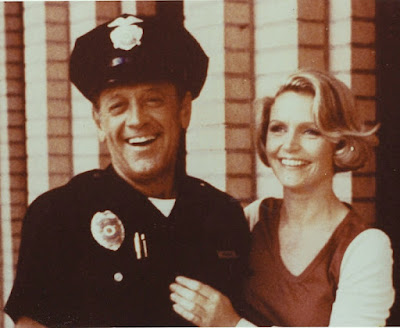 |
| William Holden and Lee Remick on the set of The Blue Knight (1973) |
It was in November 1973 that the first American TV mini-series - multi-part dramas, usually aired in one-hour segments over successive evenings - was broadcast on NBC. The series, The Blue Knight, was based on a best-selling novel by former police officer Joseph Wambaugh. William Holden starred as a grizzled veteran LAPD cop with Lee as his upscale college professor girlfriend. Sam Elliott, Eileen Brennan, Joe Santos, Anne Archer and Jamie Farr helped round out the cast. The story tracked what was to be the senior cop's final case before he retired, and was set mostly in a run down area of L.A. among the local hoods, hookers, junkies, and other down-and-outers. I suspect a young and impressionable Quentin Tarrantino must've seen this one first-run. The drama was a showcase for Holden who nailed his role as a tired and tough but decent old cop. Lee's character, like the rest of the cast, had much less screen time, but she did a fine job as the independent but supportive lover who was set to become the officer's wife. Holden won an Emmy for his performance and Lee was nominated for hers. The series earned more Emmy nods and was popular enough to be released into theaters in condensed form. Then, in 1975 it was retooled as a regular weekly series starring George Kennedy in the Holden role.
Following The Blue Knight, a floodgate of TV movie and mini-series offers flowed Lee Remick's way. 1974 brought what was for some time the jewel among her TV ventures, Jennie: Lady Randolph Churchill, a British production. The seven-episode mini-series followed the life of the young American woman who, while in Great Britain, met and married Lord Randolph Churchill and soon gave birth to Winston. The drama was nominated for six Emmys, including one for Lee in the title role, and won for its costume design. Lee would win a BAFTA and a Golden Globe for her elegant turn as the dazzling, determined and forever fascinating woman.
Though Lee's acting career had veered dramatically into TV in the early '70s, she still occasionally appeared on the big screen. Coming her way in 1976 was The Omen and the role of Gregory Peck's wife and the mother of Damien, the child she believes is their natural son. It was a "prestige" horror film a la Rosemary's Baby and The Exorcist, and was a massive hit that launched a franchise. The Omen turned out to be the film, perhaps unfairly, that Lee Remick is most remembered for today. For the remainder of her career, regardless of the juggernaut that was The Omen, the bulk of Lee's work, and she worked a lot, took place in TV-movies and mini-series. A few highlights:
Ike: The War Years (1979). A three-episode mini-series based on the book by Kay Summersby about Dwight "Ike" Eisenhower's years before his presidency, when he commanded the US Army during WWII. Robert Duvall starred as "Ike" with Lee as Kay, his wartime driver and lover.
Haywire (1980). A TV-movie based on the memoir of Brooke Hayward, daughter of actress Margaret Sullavan and producer Leland Hayward. In this depiction of the erratic Hollywood years in the Sullavan/Hayward household, Lee portrayed Margaret Sullavan with Jason Robards co-starring as Leland Hayward.
The Women's Room (1980). A TV-movie based on Marilyn French's best-selling feminist novel. Lee starred as a woman who leaves her philandering husband and goes back to college where she meets other women who help motivate her to become both successful and independent. Co-stars included Colleen Dewhurst, Tyne Daly and Patty Duke.
Lee would continue to appear on screens large and small until the end of the 1980s. She had just completed a TV-movie, Dark Holiday (1989), when she was diagnosed with cancer. Two years later, in 1991, she passed away at age 55. The lovely, multi-talented actress may have lived a short life, but it was surely a richly creative one. Her acting credits included 28 films, 25 TV movies and mini-series and seven stage shows. She'd been nominated for an Oscar, seven Emmys, a Tony, and won a BAFTA and two Golden Globes among other awards in the course of her busy and wide-ranging career.
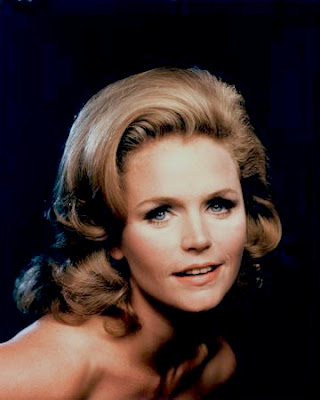 |
| Lee Remick, Dec. 14, 1935 - July 2, 1991 |
~
This is my entry for the Classic Movie Blog Association's 2023 Spring Blogathon, BIG Stars on the Small Screen. Click here for links to some fabulous contributions from members of the CMBA.




I loved this excellent post on an actress I've long admired. I've seen many of her films, but not a single TV performance! There're several you covered that I would like to check out, starting with The Blue Knight -- I remember when this came on TV. I definitely want to see Jennie -- so glad to see that it's accessible on YouTube. I never thought about Lee Remick's early film roles being so much the same, but she really did a great job overcoming that initial typecasting. Thank you, Patty, for another first-rate post and for joining the blogathon!
ReplyDeleteI've always been a huge fan of Lee Remick's. There was a time in the '70s and '80s when I thought of her as "Queen of the Mini-Series," she seemed to be in so many. Like you, I didn't realize she was so consistently cast as a sexy type in her early films. It was as I was working on this post that I saw it very clearly. Interesting, too, that she was viewed as two such different types. - Bardot and Kelly. Hope you can see "Jenny" - and "The Blue Knight," too, especially if you can find it in separate segments (shown all together, it's a little slow). Always love to hear from you, Karen, and thanks for putting together this blogathon.
DeleteGreat overview of Lee Remick’s career. I knew nothing about her before reading this (other than seeing her very young in Anatomy of a Murder and A Face in the Crowd), and it was an excellent introduction to her work.
ReplyDeleteThanks, hope you have a chance to see some of her later work.
DeleteI didn’t mean to post that previous comment anonymously. Thanks again for a great overview of Lee Remick!
ReplyDeleteGlad to know who posted!
DeleteLovexLeexRemick so glad of a few more to check out. Would recommend her in Telefon, it's a fab Cold War movie..
ReplyDeleteI saw Telefon years ago on TV, but don't remember much about it. Will revisit. There are quite a few films/TV films I didn't mention in the interest of staying on point. One that I watched recently was A Delicate Balance (1973). It's basically a (Tony Richardson) filming of an Edward Albee play. I didn't really care for it (wealthy family that drinks and viciously infights) but wanted to see Lee, along with Katharine Hepburn, Paul Scofield and Joseph Cotten. What I did like was Lee's performance. Different. As a spoiled and confused and very angry daughter. She was great in a part so different from most of those she was cast in. Good to hear from you!
DeleteShe really was an amazing actress, and I will check here out in this one. I also enjoyed her with Burton in The Medusa Touch, so many good films and TV, someome will definitely have to tribute her with a blogathon one day...
DeleteI you host a blogathon, I'll be your first sign-up. I saw the Medusa Touch not that long ago. Couldn't resist the Burton/Remick combo. By the way, wasn't really recommending A Delicate Balance, it's dated and over-the-top. Sort of an upscale Who's Afraid of Virginia Woolf? in terms of ugly family relations and ongoing grievances.
DeleteAn actress as elegant as the Lady Eve herself! Simply a perfect post. Jennie, Haywire, The Women's Room - all so wonderful. As always, you knock it out of the park.
ReplyDeleteOh, to be as elegant as Lee Remick...thanks, Marsha.
DeleteSashay over to Youtube & get a gander out of Lee singing, Anyone Can Whistle from the same-named Sondheim musical. It's quite lovely.
ReplyDeleteYes, thanks. He and she became very good friends. YouTube also has the video of her in the concert version of "Follies."
DeleteI saw her in The Competition first--she was marvelous in it--and only then went back to see her earlier work. What a talent. I am definitely checking out the Churchill series. It sounds so fascinating.
ReplyDeleteGlad to hear you'll be watching the Churchill mini-series. I think of it as her "calling card" among her mini-series and TV movie roles.
DeleteOkay, I will confess! As a young teen, I had major crush on Lee Remick! I even convinced my parents to see her on Broadway in WAIT UNTIL DARK ( my first Broadway show). She was great and I was greatly disappointed when I found out she would not be in the film version. She was a superb actress with a subtle sexy sophistication lacking in so many others. Great post.
ReplyDeleteHow I envy you, John, that you saw her in Wait Until Dark. Wow. Great "first Broadway show," I'd say. Yes, she was superb and special and deserves more attention than she gets. Great to hear from you.
DeleteLovely post on Lee Remick, whose work I've enjoyed through the years, but I'd forgotten how many mini-series she'd done. TV really did present some great opportunities back in the day, and she was apparently clear-headed about her talent and her choices. Thanks!
ReplyDeleteYou put it very well, Jacqueline, she was "clear-headed about her talent and her choices." She was one who was more interested in performing in projects that interested her than in being a movie star.
DeleteI really enjoyed your post about Lee Remick. She's in two great noirs: A Face in the Crowd, Experiment in Terror. The latter is a noncomedic stunner from everyone involved, including Blake Edwards, who isn't usually remembered for noir! It's been a long time since I have seen Days of Wine and Roses. And you mention plenty of other films that I have not yet seen. Time for me to get to work, so to speak! --Marianne
ReplyDeleteAnother one of interest that you might want to check out is The Detective. It's a policier not noir, but pretty dark and she's got a good role in it as the wayward wife of detective Frank Sinatra. Have you seen No Way to Treat a Lady? She also did a TV version of The Letter, the Bette Davis noir, which I haven't seen.
DeleteI had to look it up, but yes, I have seen The Detective. I want to see it again. (A police procedural can be a noir, yes? I wonder if a blogathon about film fans taking different sides about which films are noir and which aren't would work?)
DeleteIn any case, thank you for reminding me about Lee Remick and The Detective. It's worth another look, and this time I'll have to take note of Remick's performance.
A blogathon discussion of what bloggers consider noir/not noir could be interesting. I think of it more as a style than a genre, but there are a thousand opinions on the subject. BTW, I'm thinking of revisiting The Detective again myself.
DeleteMaybe we should cohost a blogathon some time: Is This a Film Noir? I was thinking of David Letterman's bit on his late night talk show: Is This Anything? The audience would judge if the person had an act or not! I always got a kick out of it. (I digress!)
DeleteI would absolutely be interested in co-hosting a Noir/Not Noir blogathon with you, Marianne. Let's get in touch.
DeleteI'll put some of my preliminary thoughts in writing over the weekend, and then e-mail you next week. (I've been pretty busy of late.)
DeleteGot it!
DeleteI have always been a Lee Remick fan. Even in small roles, such as the one you mentioned in The Long, Hot Summer, she brought life to her characters and made them memorable (I could easily identify with the boys calling out her character's name, Eula, on the front porch!). She was excellent in a number of films, many of which you mentioned (Days of Wine and Roses, No Way to Treat a Lady). She was in fine form, too, as Amy Irving's driven piano teacher in The Competition and opposite Charles Bronson in the highly entertaining thriller Telefon. She deserved better roles for most of her career, but she worked steadily and took all her acting jobs seriously regardless of the quality of the material. Thanks for highlighting Ms. Remick's career!
ReplyDeleteI'm not sure I've seen The Competition - or maybe not for a very long time - but it's been mentioned in comments a couple of times and I'm going to check it out. As for her film career, I came upon an interview during my research in which she said that there was a point when she seemed always to be losing roles to Audrey Hepburn. Tough competition.
DeleteI've always been a fan and glad to know you are, too.
Hi, I adore Lee Remick! Like a lot of talented young actresses like Angie Dickinson & Suzanne Pleshette, good roles were hard to come by on the big screen by the end of the '50s. Lee was luckier than most, but eventually found better work on TV. Lovely, good at drama and comedy, and could even sing! Loved seeing this career recap, cheers, Rick
ReplyDeleteAll adorers of Lee Remick are happily welcomed here. So glad you're a fan, Rick, though not surprised.
DeleteSo much substance to Lee Remick, the lovely actor every single person I have ever talked to admires. Of all the work she did, The Women's Room and Haywire from 1980 sound fantastic. Why have I not seen them?!
ReplyDeleteI love this choice and your tribute to Lee, gone too soon and should be remembered.
Aurora
PS - I love that Bette Davis Oscars quote. It says a lot from that competitive grand dame.
I was so pleased when I came upon that Bette Davis quote.
Delete